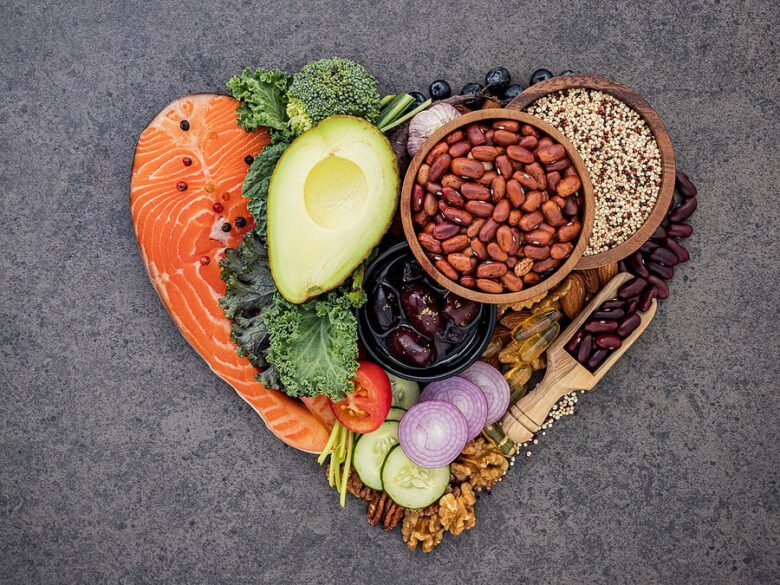Consider your heart, the most important organ in your body and a true workhorse. Day in and day out, it draws blood, oxygen, and nutrients for the rest of the body to thrive. However, heart disease as an illness remains one of the top killers globally. Thankfully, a healthy lifestyle can help in risk alleviation. Your nutrition is a significant contributor. As such, adding heart-healthy foods to what you regularly consume is one of the most profound and simplest actions to care for your heart.
This blog will describe the different components of heart-friendly nutrition, the foods that protect the heart, and practical advice on how to add these healthy foods to your diet. Most importantly, as you read on, this article will prepare you for changes that enhance your general well-being and the health of your heart to last a lifetime.
Heart-Healthy Diet And Other Topics: A Digest
There’s more to a heart-healthy diet than following a strict regimen of what to eat and not to eat. A heart-healthy diet is a balanced lifestyle approach to nutrition that nourishes the body while caring for the heart. Such a diet primarily focuses on whole, unrefined ingredients abundant in essential nutrients such as fibre, omega-3 fatty acids, and antioxidants. It is about replacing trans fats, excessive sodium, and added sugar with healthier options.
For example, replacing red meat-saturated fats with fats from fish and avocados can lower cholesterol and greatly aid heart health. Whole grains are also always preferred over refined carbs because of their fibre, which can help regulate cholesterol levels. Most importantly, a heart-friendly diet encourages moderation, which means no overindulgence on sugary snacks or salty treats. Consistency is the primary goal—adopting habits that support cardiovascular health over time and ultimately help your heart.
Crucial Nutrients That Keep Your Heart Healthy:
Indeed, specific nutrients aid in preserving one’s cardiovascular system. It is a proven groundbreaker in cholesterol reduction when it comes to fibre, which can be found in high quantities in fruits, vegetables, legumes, and whole grains. People consume fatty fish such as salmon or mackerel for this reason; they are rich in omega-3 fatty acids, which help in decreasing inflammation and the formation of plaque on artery walls.
Berries, green tea, and even dark chocolate are packed with antioxidants that help ease oxidative stress—a major causative of heart diseases. Nuts, seeds, and olive oil also contain healthy unsaturated fats, which are beneficial to the body. These fats not only help to maintain good cholesterol (HDL) but also suppress bad cholesterol (LDL). With the addition of potassium from bananas and leafy greens to decrease blood pressure and magnesium to support proper heart tremors, these nutrients fortify the heart, enabling it to stay strong.
Top Heart Disease Fighting Foods Along With Their Advantages:
Some foods have unique nutritional value that addresses heart health optimally. Spinach and kale, like other leafy greens, have a lot of antioxidants, vitamins, and minerals that bring blood pressure and inflammation down.
Blueberries, strawberries, and raspberries are some berries that provide strong antioxidants along with other natural compounds that aid in maintaining healthy arteries.
Salmon and sardines, together with other fatty fish, are rich in omega-3s that help in curtailing triglycerides and preventing abnormal heartbeats. Almonds and walnuts are nuts that mitigate bad cholesterol while providing essential healthy fats and proteins for the body.
Oats, quinoa, and brown rice are some examples of whole grains that are rich in fibre, which in turn causes moderation in cholesterol levels.
Beans and legumes are rich in protein but low in fat, which helps to strengthen the heart by reducing inflammation.
Avocados, with their smooth texture, are rich in creamy monounsaturated fats and potassium, which are good for the heart.
Allicin, a compound found in garlic, helps to lower blood pressure and refine cholesterol. Antioxidants found in dark chocolate with at least 70% cocoa strengthen the heart.
Last but not least, olive oil is a multipurpose cuisine that dishes out healthy fats, particularly polyphenols, which help to shield blood vessels.
Tips for Incorporating Heart-Healthy Foods into Your Diet:
Comprehending how and why to integrate a heart-healthy diet into your regimen is not that complex. Begin with replacing refined grains with whole grains. For instance, instead of white rice, barley or quinoa can be used. Instead of white bread, whole-grain bread can be used. Plan two to three meals a week that have fatty fish, like salmon or tuna, for lunch or dinner. Instead of chips or cookies, smart snacking consists of a handful of mixed nuts or fresh berries.
Increase consumption of leafy greens by incorporating spinach in omelettes or blending kale in morning smoothies. Switch to using olive oil and lemon juice as salad dressing. They are tasty and nutritious. Try adding legumes like lentils or chickpeas to soup stews or salads. Adding herbs like garlic is a great idea. They aid in flavor enhancement as well as provide health benefits. If small steps or modifications are continuously made, over time they do provide heart health benefits.
Making Heart-Healthy Lifestyle Decisions:
Heart-healthy choices come with an entire set of changes for your well-being and should be regarded as more than a simple diet. While breaking out of your comfort zone is challenging, it is important to note that a healthy lifestyle is something worth striving for. A positive attitude is helpful, and an even better way to seek motivation is to set achievable objectives. Celebrate every milestone you reach. For genuine heart health, heart-healthy diets go hand in hand with exercise, sleep, stress relief, and other positive habits.
Feeling guilty over those small diet breaks is pointless. A healthy lifestyle is a compromise. Whatever your meal is, keep in mind that there is no single meal that is responsible for you achieving your health goals. Gentle lifestyle choices and decisions do need to be embraced to stay on the path of health. Putting extra focus on heart-related changes is a choice we all should be making. The positives of making this decision go far beyond simply having a healthy heart. Imagine how many people care about you and will appreciate this healthy decision.
FAQs:
1. Which nuts are most beneficial to heart health?
Heart health is significantly improved by almonds and walnuts. These nuts are filled with great sources of fibre, healthy fats, and antioxidants that help cholesterol levels and enhance the blood vessels.
2. Which foods lower cholesterol?
Replacing saturated fats such as butter and fatty meats with unsaturated fats found in nuts, avocado, and olive oil, as well as including oats, legumes, and fruits in your diet for their abundant fibre content, will help lower your cholesterol.
3. What about cholesterol levels in eggs? Are they healthy for my heart?
Eggs undergo minimal impacts on harmful blood cholesterol levels and are nutrient-dense, so they can certainly be part of a heart-healthy diet if consumed in moderation.
4. Is it possible to eat too much fish?
For better heart health, it is most advantageous to routinely eat two servings (6–8 ounces) of fatty fish such as salmon, mackerel, or sardines in a week.
5. Does dark chocolate have any heart benefits?
Over 70% dark chocolate is most beneficial for heart health due to its high concentration of antioxidants and flavonoids that enhance circulation and reduce inflammation.




